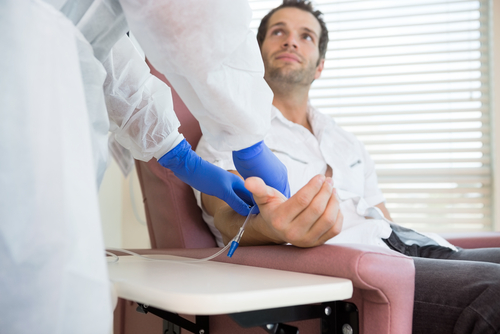Amicus on Track to Meet Milestones for AT-GAA, Other Therapies
Written by |

Amicus Therapeutics remains on track to announce top-line data from PROPEL — a Phase 3 trial of AT-GAA for the treatment of late-onset Pompe disease — in the first half of 2021, and plans to seek regulatory clearance to start clinical studies of a gene therapy for the disease.
“During the second quarter, we made tremendous progress advancing our mission for patients and are on track to achieve our 2020 key strategic priorities, including our global Fabry launch, Pompe late-stage development program, and advancing our industry-leading gene therapy pipeline,” John F. Crowley, Amicus’s chairman and CEO, said in a press release.
AT-GAA has an optimized form of the enzyme acid alpha-glucosidase (GAA) that is given with an oral small molecule called miglustat. Together, the two molecules are designed to restore the function and increase the stability of GAA, which is faulty in people with Pompe, leading to the accumulation of glycogen in cells. Notably, miglustat is used to treat Gaucher disease, under the brand name Zavesca.
The PROPEL trial (NCT03729362) has completed nearly all of the 2,810 planned infusions and assessments on schedule. The global study has recruited adults with late-onset Pompe disease to compare the safety, tolerability, and effectiveness of AT-GAA to that of alglucosidase alfa (marketed as Lumizyme in the U.S.), an enzyme replacement therapy (ERT).
Comparisons will be done in participants who have been treated with ERT, and those who have not.
As announced previously, Amicus plans to submit a rolling biologic license application (BLA) for AT-GAA in the second half of this year, and to complete its final submission and obtain full results in the first half of 2021.
A rolling review is a fast-track process that allows a company to submit completed sections of a BLA as they become ready, instead of filing the entire application at once.
Amicus will also advance manufacturing capabilities in support of the BLA and a marketing authorization application in the European Union.
Other milestones that the company anticipates reaching in the AT-GAA program this year include conducting a natural history study of roughly 100 Pompe patients treated with enzyme replacement therapy and running supportive studies, such as an open-label trial in children with Pompe, ages 12 up to 18.
The company plans to improve access to AT-GAA in young children with infantile-onset Pompe disease via an expanded access program that is now underway. Amicus also intends to enroll participants into pediatric studies this year.
Among its priorities, Amicus also wants to file an application seeking the start of clinical trials of a gene therapy for Pompe disease, and to disclose up to two additional treatment candidates. Ongoing toxicology work is expected to support this application.
The company presented positive gene therapy data at the American Society of Cell and Gene Therapy meeting in May. Its research results showed successful targeting and clearance of glycogen in a mouse model of Pompe. In non-human primates, the treatment led to therapeutic levels of an engineered form of GAA in target organs.
In addition to Pompe disease, Amicus remains on track to meet milestones in its Galafold (migalastat) program for treating Fabry disease and in two gene therapy trials related to Batten disease.
“We remain strongly positioned to achieve our vision of delivering groundbreaking new medicines and hopefully, one day, cures for people living with rare diseases,” Crowley added.


